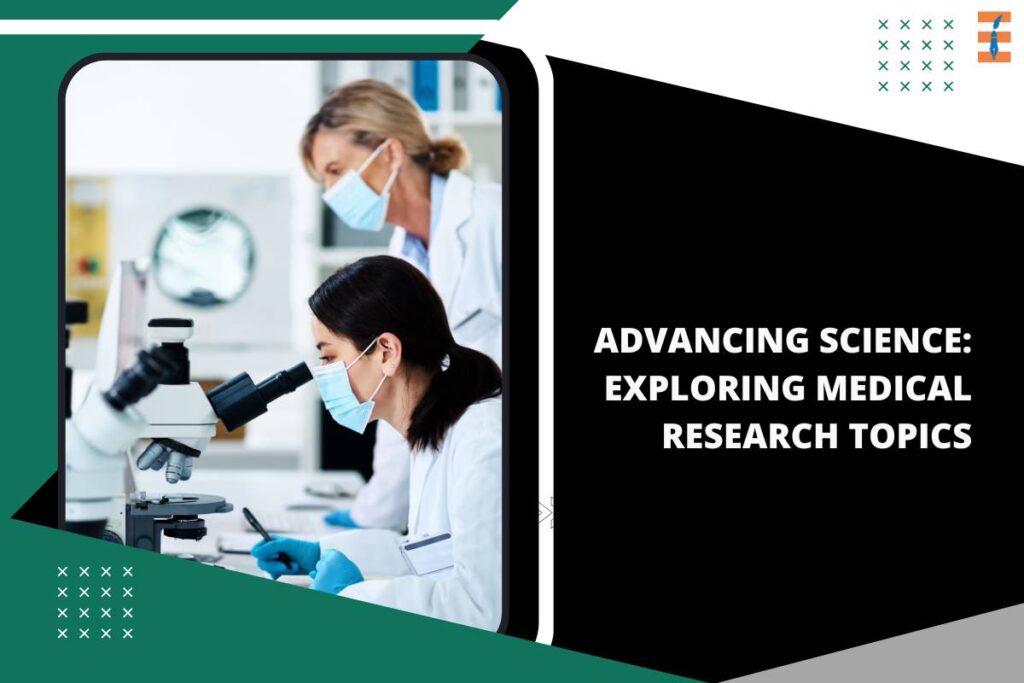Medical research is an ever-evolving field that continually seeks to improve human health and well-being. The broad spectrum of medical research topics encompasses everything from understanding the fundamental mechanisms of diseases to developing innovative treatments and preventive measures. This article delves into some of the most pressing medical research topics today, highlighting their significance, current advancements, and potential future directions.
Here are 15 medical research topics:
1. The Role of Genetics in Disease
One of the most pivotal medical research topics is the study of genetics and its impact on various diseases. Genetic research has revolutionized our understanding of conditions such as cancer, cardiovascular diseases, and neurological disorders. Researchers are now able to identify specific genes that contribute to these diseases, paving the way for personalized medicine. This approach allows for treatments tailored to an individual’s genetic makeup, increasing efficacy and reducing side effects.
For example, in cancer research, genetic profiling of tumors helps oncologists choose the most effective treatment options. Similarly, genetic research in cardiovascular diseases has led to the identification of gene variants that increase the risk of heart attacks, allowing for early intervention and preventive strategies.
2. Advances in Immunotherapy
Immunotherapy, which harnesses the body’s immune system to fight diseases, is a rapidly growing area among medical research topics. Initially focused on cancer treatment, immunotherapy has expanded to include autoimmune diseases, infectious diseases, and even some chronic conditions.

Checkpoint inhibitors, CAR-T cell therapy, and cancer vaccines are some of the groundbreaking immunotherapy approaches that have shown significant promise. Checkpoint inhibitors, for instance, work by blocking proteins that prevent the immune system from attacking cancer cells, thus enabling a more robust immune response. CAR-T cell therapy involves modifying a patient’s T cells to better recognize and attack cancer cells.
3. The Microbiome and Human Health
The human microbiome, the vast collection of microorganisms living in and on our bodies, has become a focal point in medical research topics. Studies have shown that the microbiome plays a crucial role in various aspects of health, including digestion, immune function, and even mental health.
Research into the microbiome is uncovering its impact on conditions such as obesity, diabetes, inflammatory bowel disease, and depression. By understanding the complex interactions between the microbiome and the human body, scientists hope to develop new treatments that restore healthy microbial balance. Probiotics, prebiotics, and fecal microbiota transplants are some of the interventions being explored to manipulate the microbiome for therapeutic benefits.
4. Neurodegenerative Diseases
Neurodegenerative diseases like Alzheimer’s, Parkinson’s, and amyotrophic lateral sclerosis (ALS) represent some of the most challenging medical research topics. These conditions involve the progressive degeneration of nerve cells, leading to debilitating symptoms and, ultimately, death.
Recent advancements in neurodegenerative disease research include the identification of biomarkers for early diagnosis, the development of neuroprotective therapies, and the use of stem cells to regenerate damaged neural tissue. Understanding the underlying mechanisms of these diseases is crucial for developing effective treatments and improving the quality of life for affected individuals.
5. Regenerative Medicine and Stem Cell Research
Regenerative medicine, which focuses on repairing or replacing damaged tissues and organs, is a transformative area within medical research topics. Stem cell research is at the forefront of this field, offering the potential to regenerate tissues lost to injury, disease, or aging.
Stem cells have the unique ability to develop into various cell types, making them invaluable for treating conditions such as spinal cord injuries, heart disease, and diabetes. Clinical trials using stem cells for regenerative purposes are underway, with some showing promising results. Additionally, advances in tissue engineering and 3D bioprinting are paving the way for the creation of lab-grown organs, which could address the shortage of donor organs for transplantation.
6. Infectious Diseases and Vaccine Development
The COVID-19 pandemic has underscored the critical importance of medical research topics related to infectious diseases and vaccine development. The rapid development and deployment of COVID-19 vaccines have demonstrated the potential of modern medical research to respond to global health crises.
Beyond COVID-19, researchers are focused on developing vaccines for other infectious diseases such as HIV, malaria, and tuberculosis. Advances in mRNA technology, which proved successful for COVID-19 vaccines, are being applied to create vaccines for these and other challenging diseases. Moreover, ongoing research into antiviral drugs and diagnostic tools is essential for managing and preventing future outbreaks.
7. Chronic Disease Management
Chronic diseases, including diabetes, hypertension, and chronic obstructive pulmonary disease (COPD), are leading causes of morbidity and mortality worldwide. As such, they are critical medical research topics aimed at improving disease management and patient outcomes.

Research in this area focuses on understanding the pathophysiology of chronic diseases, developing novel therapeutic agents, and improving patient adherence to treatment regimens. Digital health technologies, such as wearable devices and telemedicine, are also playing an increasingly important role in chronic disease management by enabling continuous monitoring and personalized care.
8. Mental Health Research
Mental health research is gaining recognition as a crucial area within medical research topics. Conditions such as depression, anxiety, bipolar disorder, and schizophrenia affect millions of people globally, yet there remain significant gaps in understanding their underlying causes and effective treatments.
Current research efforts are exploring the genetic, environmental, and neurobiological factors contributing to mental health disorders. Advances in neuroimaging and biomarkers are improving diagnosis and treatment personalization. Additionally, new therapeutic approaches, including psychedelics and digital therapeutics, are being investigated for their potential to revolutionize mental health care.
9. Precision Medicine
Precision medicine is an innovative approach that considers individual variability in genes, environment, and lifestyle for each person. This approach aims to tailor medical treatment to the individual characteristics of each patient, making it a prominent topic among medical research topics.
By leveraging big data, artificial intelligence, and genomic information, precision medicine seeks to improve the accuracy of diagnoses, predict disease risks, and develop personalized treatment plans. The ultimate goal is to move away from the “one-size-fits-all” model of medicine towards more precise, effective, and personalized healthcare.
10. Cardiovascular Research
Cardiovascular diseases remain a leading cause of death worldwide, making cardiovascular research one of the most critical medical research topics. This field encompasses a wide range of studies, from understanding the molecular mechanisms of heart disease to developing advanced diagnostic and therapeutic tools.
Recent advancements include the identification of new biomarkers for early detection, the development of minimally invasive surgical techniques, and the creation of innovative drugs to manage conditions like hypertension and hypercholesterolemia. Researchers are also exploring the potential of regenerative medicine to repair damaged heart tissue and improve heart function.
11. Oncology and Cancer Research
Cancer research continues to be a vital area among medical research topics. With cancer being one of the leading causes of death globally, there is a constant need for better understanding, early detection, and more effective treatments.
Research efforts in oncology are focused on understanding the genetic and environmental factors that contribute to cancer development. Advances in molecular biology and genomics are enabling the identification of new cancer biomarkers, which can lead to earlier diagnosis and personalized treatment plans. Immunotherapy, targeted therapy, and precision medicine are some of the innovative approaches being developed to combat various types of cancer.
12. Aging and Longevity
As the global population ages, research into aging and longevity has become increasingly important. This area of study aims to understand the biological processes that drive aging and to develop interventions that promote healthy aging and extend lifespan.
Medical research topics in this field include studying the role of genetics, diet, and lifestyle in aging, as well as the development of anti-aging therapies. Researchers are also exploring the potential of senolytics, which are drugs that target and eliminate senescent cells, to improve healthspan and reduce the burden of age-related diseases.
13. Rare Diseases and Orphan Drugs
Rare diseases, often referred to as orphan diseases, affect a small percentage of the population but collectively impact millions of people worldwide. Research into rare diseases is crucial for developing effective treatments and improving the quality of life for affected individuals.
Medical research topics in this area include understanding the genetic and molecular basis of rare diseases, developing diagnostic tools, and creating targeted therapies. The development of orphan drugs, which are medications designed specifically for rare conditions, has been accelerated by regulatory incentives and advancements in biotechnology.
14. Environmental Health and Toxicology
Environmental health research focuses on understanding how environmental factors, such as pollution, chemicals, and radiation, impact human health. This area is essential for developing strategies to prevent and mitigate the adverse health effects of environmental exposures.

Medical research topics in environmental health include studying the health impacts of air and water pollution, investigating the effects of climate change on health, and assessing the risks associated with exposure to toxic substances. This research is vital for informing public health policies and protecting vulnerable populations.
15. Health Disparities and Equity
Health disparities and equity research aim to understand and address the differences in health outcomes among different population groups. These disparities can be influenced by factors such as socioeconomic status, race, ethnicity, and geography.
Research in this area focuses on identifying the root causes of health disparities, developing interventions to reduce inequities, and promoting health equity. Medical research topics include studying the impact of social determinants of health, improving access to healthcare, and developing culturally appropriate interventions to address the unique needs of diverse populations.
Conclusion
Medical research is a vast and dynamic field that encompasses a wide range of topics, each with the potential to significantly impact human health. From genetics and immunotherapy to mental health and environmental health, these medical research topics represent the forefront of scientific discovery and innovation. As researchers continue to explore these areas, the knowledge gained will lead to improved diagnostics, treatments, and preventive measures, ultimately enhancing the quality of life for people worldwide.
The ongoing advancements in medical research topics are a testament to the dedication and ingenuity of scientists and healthcare professionals. Their efforts not only advance our understanding of complex health issues but also pave the way for a healthier future for all.










